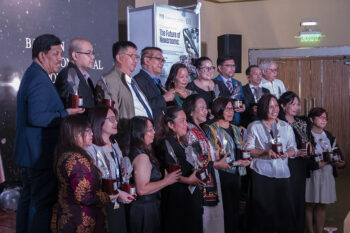
NAAWAN, Misamis Oriental (MindaNews / 29 Sep) – Human rights advocates were jolted from their seat when out of the blue President Rodrigo Roa Duterte, notorious to charges of human rights violation and facing imminent arrest by the International Criminal Court for alleged crimes against humanity, cried foul over the Senate’s detention of Lincoln Ong, and rushed to his defense. He accused the Senate of violating Ong’s fundamental rights, reminding all and sundry of the constitutional imperative that “no person shall be deprived of life, liberty of property without due process of law.” PRRD declared that what the Senate did to Ong was worse than martial law.
The Senate Blue Ribbon Committee, investigating the purchases of the Department of Health (DOH) from Pharmally Pharmaceutical Corp. through the Procurement Service-Department of Budget and Management (PS-DBM) during the start of the pandemic in 2020, cited Ong for contempt and ordered his detention for dodging questions as regards the P8.6 billion worth of transactions between the government and the firm.
In the last hearing of the Committee, Ong admitted that Michael Yang, former economic adviser to President Duterte, lent them money to finance the firm’s huge supply contracts with the government. Ong’s refusal to disclose the amount Yang loaned to Pharmally, triggered the decision of the Committee to commit him at the Pasay City Jail. The Committee, however, retracted sending him to jail fearing of his safety in said facility and, thus, Ong has remained under Senate custody, detained at the Office of the Sergeant at-Arms until such time that he answers the questions of the Committee.
Duterte, a lawyer, rose to the height of power as a crusader against corruption. Now he comes in lawyering for those suspected of corruption or in defrauding the government. He earlier defended Yang, who is being linked to the controversial Pharmally Pharmaceutical Corp., as simply a go-between the government and Chinese suppliers of pandemic needed supplies and equipment.
Duterte, in defense of Yang, once said: “Eh siyempre may negosyo nakikisali, negosyante eh. Anong magawa mo?”
[Of course, he has a business and wants to be involved. He is a businessman after all. What can you do?]
His demeanor is utterly gratuitous, a mighty disservice to his office. His concern over the rights of Ong is misplaced. PRRD, being a lawyer and former congressman, should know better. The Senate can cite a witness for contempt and may punish him according to its rules or under existing jurisprudence or law, in furtherance of its power to conduct investigation in aid of legislation, as provided for in Section 21, Article VI of the Constitution, which says, to wit:
“The Senate or the House of Representatives or any of its respective committees may conduct inquiries in aid of legislation in accordance with its duly published rules of procedure. The rights of persons appearing in or affected by such inquiries shall be respected.”
The Senate’s power to investigate is usually delegated to either its standing committees, special committees set up for a specific purpose, or carried out by joint committees.
Senate and House investigations are conducted to gather information on the need for future legislation in response to a certain, social, economic and political development, to test the effectiveness or correct loopholes of laws already passed, to inquire into the qualifications and performance of members and officials of the other branches of government. More often, committees call on outside experts to assist in conducting investigative hearings and to make detailed studies of issues.
Most committee hearings are open to the public and are covered and reported in the mass media. Senate or congressional investigations, for that matter, thus represent one important instrument available to lawmakers to inform the citizenry and arouse public interest in national issues and concerns.
The Senate Committee on the Accountability of Public Officials popularly known as the Blue Ribbon Committee is tasked to investigate alleged wrongdoings of the government, its officials, and its attached agencies, including government owned and controlled corporations, in aid of legislation. It is currently investigating the DOH and PS-DBM in their management of billions of pesos of government funds in response to the pandemic.
Congressional committees have the power to compel testimony from unwilling witnesses, and to cite for contempt witnesses who refuse to testify and for perjury those who give false testimony. They enforce their rules on appropriate punishment.
The Senate in citing a witness for contempt may detain him in its premises until such time that he purges himself of contempt.
The Supreme Court, wary, however, of the indefinite detention of those cited for contempt of Senate, prescribes (G.R. No. 234608, July 03, 2018) that the period of imprisonment under the inherent power of contempt by the Senate during inquiries in aid of legislation should only last until the termination of the legislative inquiry under which the said power is invoked.
Accordingly, as long as there is a legitimate legislative inquiry, then the inherent power of contempt by the Senate may be properly exercised. Conversely, once the said legislative inquiry concludes, the exercise of the inherent power of contempt ceases and there is no more genuine necessity to penalize the detained witness.
The Senate, to preserve itself, may, indeed throw an uncooperative, disrespectful and contumacious witness to jail under an existing statutory provision of the Revised Penal Code (RPC). Article 150 of the RPC penalizes a witness who refuses to cooperate in any legal inquiry before Congress such as in responding to a subpoena, submission of documents and to answer questions. The crime is punishable by arresto mayor or a fine ranging from two hundred to one thousand pesos or both such fine and imprisonment. Arresto mayor carries a jail term from one month and one day to six months.
Verily, what the Senate did to witness Lincoln Ong was not beyond bounds. In fact, the Senate could have done more but was holding its reign and showed leniency to him by not committing him to jail.
(MindaViews is the opinion section of MindaNews. William R. Adan, Ph.D., is retired professor and former chancellor of Mindanao State University at Naawan, Misamis Oriental, Philippines.)







